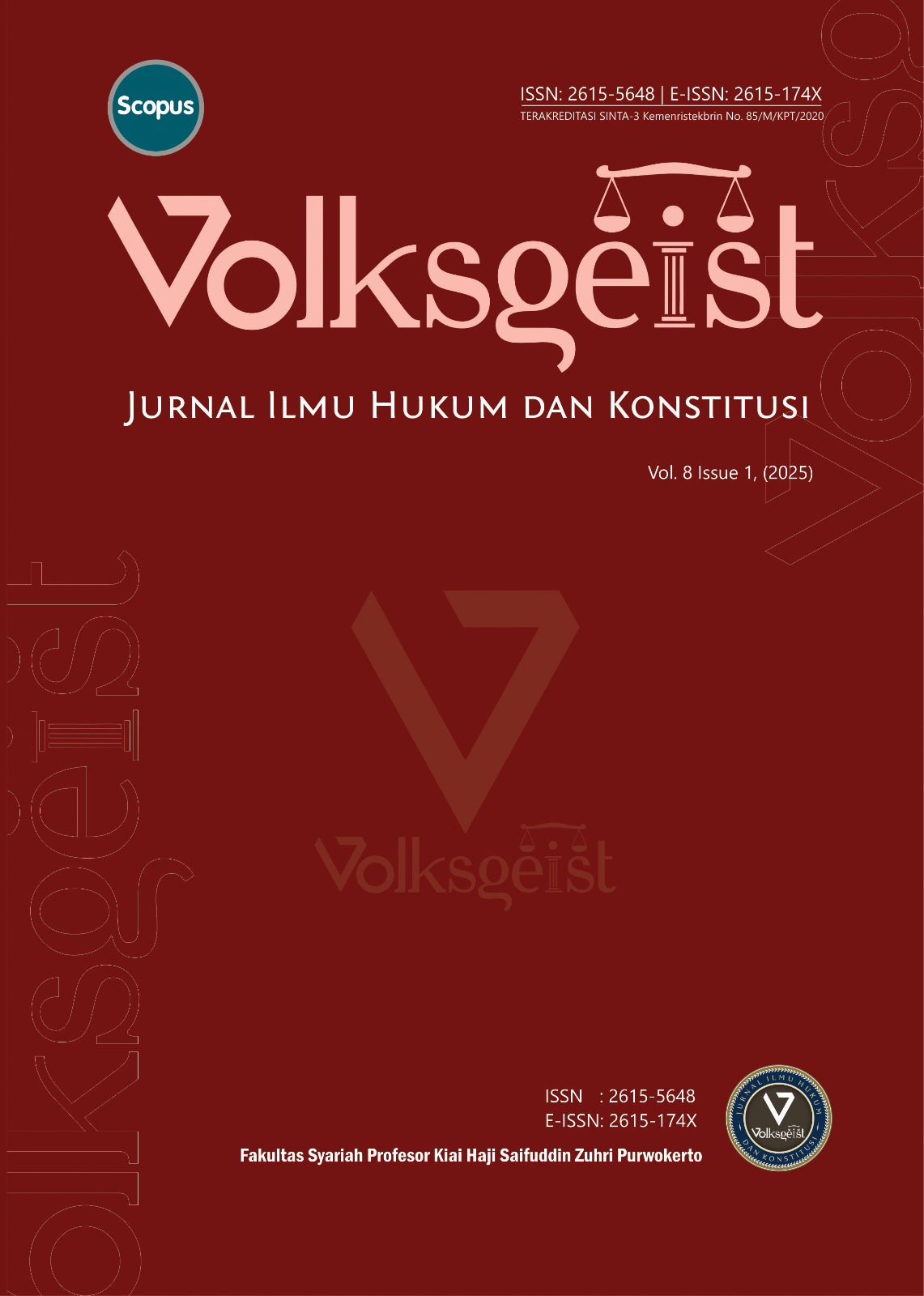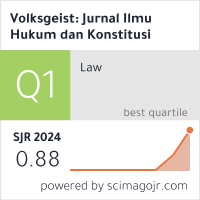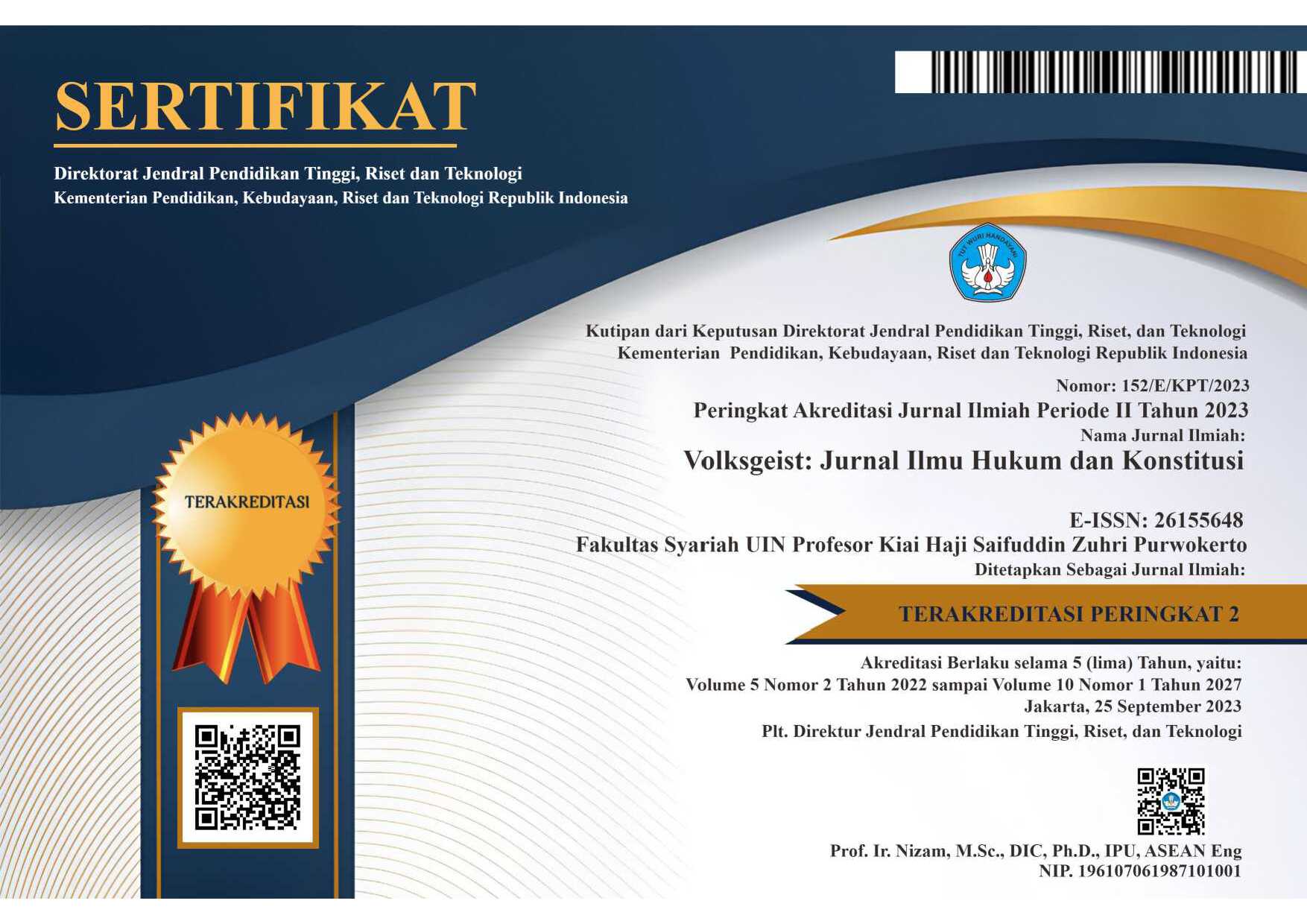Inheriting Inequity: A Comparative Legal Dissection of Gender Discrimination in Indonesian Inheritance Law
DOI:
https://doi.org/10.24090/volksgeist.v8i1.12994Keywords:
Gender inequality; Indonesian inheritance law; comparative legal system.Abstract
As Indonesia adopts Islamic law, civil law, and customary law in its legal system, it is suspected that some serious issues emerge in its implementation. One of them is gender inequality issue in its inheritance law. While the Convention on the Elimination of All Forms of Discrimination Against Women (CEDAW) has been ratified by the country, discriminatory practices persist as a result of patriarchal interpretations of the law and dominant patrilineal customs. This study aims to analyze gender inequality in inheritance distribution by examining how legal systems in Indonesia align with or diverge from the international human rights norms, particularly CEDAW. Using a normative legal method and comparative approach, this study looked into the legal structure, substance, and culture of inheritance legal systems in predominantly Muslim countries such as Egypt, Tunisia, Morocco, Pakistan, Thailand, Malaysia, Singapore, Brunei Darussalam, and Indonesia based on Lawrence Friedman’s legal system theory. The results showed that Indonesia’s civil law had a tendency to conform to the international gender equality norms. However, the Islamic and customary inheritance practices in the country were still strongly influenced by patriarchal values. In comparison, some of the other countries studied in this research demonstrated greater flexibility in aligning their Islamic inheritance laws with the gender justice principles. These findings underscored the urgent need for Indonesia to develop context-sensitive legal reform strategies that include progressive ijtihad, transformation of patriarchal customs, and synchronization of the national inheritance law with the international human rights standards.Downloads
References
Ahmad. “Legal Pluralism and Women’s Rights in Southeast Asia.” Asian Journal of Comparative Law 13, no. 1 (2020): 65–89.
———. “Patriarchy and Law: Gender Inequality in Indonesian Inheritance Law”, Journal of Southeast Asian Studies.” Journal of Southeast Asian Studies 45, no. 2 (2021): 345–67.
An-Na’im, Abdullahi Ahmed. Human Rights in Cross-Cultural Perspectives: A Quest for Consensus. University of Pennsylvania Press, 2010.
An-Naim, Abdullahi Ahmed. Islam and the Secular State: Negotiating the Future of Sharia. Harvard University Press, 2008.
Apik Anitasari Intan Saputri. “Reaktualisasi Hukum Islam Munawir Sjadzali Dan Kontekstualisasi Doktrin Islam Pribumi Abdurrahman Wahid.” Khuluqiyya: Jurnal Kajian Hukum Dan Studi Islam, January 2, 2021, 24–50. https://doi.org/10.56593/khuluqiyya.v3i1.54.
Arauf, Muta Ali. “The Existence of Women in the Traditional Rituals of the Jatilawang Bonokeling Community in Banyumas Regency.” International Journal of Social Science and Religion (IJSSR), August 18, 2023, 347–66. https://doi.org/10.53639/ijssr.v4i3.187.
Ardhanariswari, Riris, Tenang Haryanto, Manunggal KW, and Siti Kunarti. “Local Government Efforts in Realizing Gender Responsive Regional Policies in Banyumas District.” Jambe Law Journal 4, no. 1 (October 31, 2021): 1–19. https://doi.org/10.22437/jlj.4.1.1-19.
Assembly, U N General. “Convention on the Elimination of All Forms of Discrimination against Women.” Retrieved April 20 (1979): 2006.
Azhari Akmal Tarigan. “Implementation of Inheritance Law in Minangkabau Muslim Society.” Journal of Islamic Law, 2014.
Bedner, Adriaan. “Colonial Legacies: State Law and Traditional Law in Indonesia.” The Journal of Legal Pluralism and Unofficial Law 50, no. 2 (2018): 207–226.
Brown, Nathan. Islamic Law in Brunei: Tradition and Modernity in Southeast Asia. California: University of California Press, 2020.
Burhan. Indonesian Islam: An Exploration of Nusantara Islam and Its Social Dimension. Jakarta: LIPI Press, 2017.
Burns, Peter. The Leiden Legacy: Concepts of Law in Indonesia. KITLV Press Leiden, 2004.
Cammack, Mark E, and R Michael Feener. “The Islamic Legal System in Indonesia.” Pac. Rim L. & Pol’y J. 21 (2012): 13.
Charrad, Mounira. States and Women’s Rights: The Making of Postcolonial Tunisia, Algeria, and Morocco. Univ of California Press, 2001.
Dawoud S. El Alami. Islamic Family Law in Egypt, Dalam Islamic Family Law, Ed. Carroll V. Findlay Dan Eugene Cotran. London: Routledge, 2021.
Departemen Agama, R I. Al-Qur’an dan terjemahan, Jakarta: PT Syaamil Cipta Media § (2005).
Faizah, Nur, Ahmad Rezy Meidina, Achmad Lubabul Chadziq, Moch. Iqbal, and M. Shaiful Umam. “The Role of Indonesian Women Ulama Congress (KUPI) in the Search for Gender Equality-Based Islamic Law.” Al-’Adalah 21, no. 2 (December 25, 2024): 323. https://doi.org/10.24042/adalah.v21i2.23698.
Friedman, Lawrence M. The Legal System: A Social Science Perspective. New York: Russell Sage Foundation, 1987.
Gluckman, Max. “Adat Law in Indonesia.” J. Comp. Legis. & Int’l L. 3d Ser. 31 (1949): 60.
Gobe, Eric. “The Reform of Family Law in Tunisia: The Re-Establishment of Gender Equality?” Journal of North African Studies 25, no. 3 (2020): 341–60.
Griffiths, John. “What Is Legal Pluralism?” The Journal of Legal Pluralism and Unofficial Law 18, no. 24 (January 1986): 1–55. https://doi.org/10.1080/07329113.1986.10756387.
Gulam, Hyder. “THE APPLICATION OF SHARIAH (ISLAMIC LAW) IN SOME DIFFERENT COUNTRIES AND ITS IMPLICATIONS.” Jurnal Syariah 24, no. 2 (July 13, 2017): 321–40. https://doi.org/10.22452/js.vol24no2.7.
Hadi, Solikul. “Bias Gender Dalam KonstruKsi HuKum Islam Di Indonesia.” Palastren: Jurnal Studi Gender 7, no. 1 (2016): 25–46.
Haqqi, Abdurrahman Raden Aji. “Islamic Law in Brunei Darussalam: Past, Present and Future.” GIC Proceeding 1 (2023): 110–16.
Hariyanto, Hariyanto, Mabarroh Azizah, and Nurhidayatuloh Nurhidayatuloh. “Does the Government’s Regulations in Land Ownership Empower the Protection of Human Rights?” Journal of Human Rights, Culture and Legal System 4, no. 2 (May 2024): 391–421. https://doi.org/10.53955/JHCLS.V4I2.222.
Hariyanto, Hariyanto, Ahmad Rezy Meidina, and Mabarroh Azizah. “Decentralization and the Fulfilments of Children’s Rights: Challenges and Opportunities for Local Government in Indonesia.” Lex Scientia Law Review 8, no. 2 (November 30, 2024): 677–706. https://doi.org/10.15294/lslr.v8i2.14373.
Hidayah, Sita. “From Unity in Diversity to Culture Wars? Aceh Women’s Mastery over Adat, Islam, and the State Inheritance Laws.” Women’s Studies International Forum 103 (March 2024): 102881. https://doi.org/10.1016/j.wsif.2024.102881.
Hooker, M B. “Introduction: Islamic Law in South-East Asia.” Australian Journal of Asian Law 4, no. 3 (2002): 213–31.
Hooker, MB. “Legal Pluralism in Southeast Asia: The Interaction of Law and Custom in Thailand and Malaysia.” Asian Journal of Comparative Law 12, no. 1 (2018): 65–78.
———. “Sharia Law and the National Law of Indonesia.” Oxford Journal of Law and Religion 7, no. 2 (2019): 287–305.
Hooker, Michael Barry. Indonesian Syariah: Defining a National School of Islamic Law. Institute of Southeast Asian Studies, 2008.
Ibrahim, Ahmad. “Islamic Law in Singapore: Faraid and AMLA.” Journal of Southeast Asian Legal Studies 6, no. 1 (2019): 88–105.
———. “The Legal Status of Muslims in Thailand.” Journal of Southeast Asian Law 8, no. 2 (2016): 103–21.
International, Siam Legal. Civil and Commercial Code of Thailand, Section 1622 (n.d.).
Irianto, Sulistyowati. “Competition and Interaction between State Law and Customary Law in the Court Room: A Study of Inheritance Cases in Indonesia.” The Journal of Legal Pluralism and Unofficial Law 36, no. 49 (January 2004): 91–112. https://doi.org/10.1080/07329113.2004.10756574.
———. “Customary Law vs State Law: Inheritance Cases in Indonesia.” Indonesian Journal of Law and Society, 2013.
Khaleel, Badriah. “Critical Discourse Analysis of Pakistani Inheritance Law and Justice System for Women.” Pakistan Social Sciences Review 7, no. III (September 30, 2023). https://doi.org/10.35484/pssr.2023(7-III)08.
Kozlowski, Gregory C. “Farzana Shaikh. Community and Consensus in Islam: Muslim Representation in Colonial India, 1860–1947.(South Asian Studies, Number 42.) New York: Cambridge University Press. 1989. Pp. Xiv, 257.” Oxford University Press, 1991.
———. “Islamic Law in the Modern World.” Update on L. Related Educ. 16 (1992): 8.
Lev, Daniel S. Islamic Courts in Indonesia: A Study in the Political Bases of Legal Institutions. Vol. 12. Univ of California Press, 1972.
Lubis, Sakban. “Pembagian Harta Waris Pada Masyarakat Muslim Mandailing Natal (Kajian Sosiologis Hukum Islam Di Mandailing Natal).” Universitas Islam Negeri Sumatera Utara, 2020.
Lukito, Ratno. Legal Pluralism in Indonesia: Bridging the Unbridgeable. Routledge, 2012.
Mahmoud, Fathi. Gender Equality in Egyptian Inheritance Law: An Ongoing Challenge. Cairo: Cairo University Press, 2020.
Manse, Maarten. “Colonial Law and Indigenous Peoples: The Legacy of Dutch Legal Practices in Indonesia.” Journal of Legal History 35, no. 2 (2019): 223–34.
Mayer, Ann. Gender and the Politics of Rights: Islamic Law and Human Rights. Westview Press, 2007.
Mayer, Ann Elizabeth. Islam and Human Rights: Tradition and Politics. Routledge, 2018.
Meidina, Ahmad Rezy. “Anak Di Luar Kawin Dalam Hukum Kewarisan Islam: Sebuah Ragam Perspektif Dan Analisa.” El-Aqwal : Journal of Sharia and Comparative Law, August 1, 2022, 1–14. https://doi.org/10.24090/el-aqwal.v1i1.6778.
———. “Legal System of Polygamy and Divorce in Muslim Countries: Comparative Studies among Turkey, Pakistan, and Indonesia.” Matan : Journal of Islam and Muslim Society 5, no. 1 (May 24, 2023): 15. https://doi.org/10.20884/1.matan.2023.5.1.8301.
Merry, Sally Engle. Legal Pluralism and Human Rights: Challenges of Tradition and Modernity. oxford: Oxford University Press, 2012.
Moghadam, Valentine M. “Gender and National Development in Egypt.” Social Research 60, no. 3 (2018): 523–49.
Muhammad Abduh. “Analisis Hukum Terhadap Tradisi Penundaan Pembagian Harta Warisan Kepada Ahli Warisnya (Studi Kasus Di Kelurahan Purbaratu Kecamatan Purbaratu Kota Tasikmalaya).” Khuluqiyya: Jurnal Kajian Hukum Dan Studi Islam, July 25, 2021. https://doi.org/10.56593/khuluqiyya.v3i2.65.
Musaddad, Endad, Muhammad Ishom, Mohd Norhusairi Mat Hussin, and Ahmad Jamaludin Jambunanda. “Guaranteeing the Rights of Children and Women Post-Divorce: A Comparative Study Between Indonesia and Malaysia.” Volksgeist: Jurnal Ilmu Hukum Dan Konstitusi, April 18, 2025, 1–14. https://doi.org/10.24090/volksgeist.v8i1.12214.
Mustari, Abdillah. “Perempuan Dalam Struktur Sosial Dan Kultur Hukum Bugis Makassar.” Al-’Adl 9, no. 1 (2016): 127–46.
Nashirun, Kurniati. “Konsep Keadilan Dan Kesetaraan Gender Tentang Pembagian Harta Waris Dalam Persfektif Hukum Islam.” Madani Legal Review 6, no. 1 (2022): 65–78.
Nasir, Jamal J. The Status of Women under Islamic Law and Modern Islamic Legislation. Brill, 2009.
Nation, United. CEDAW/C/IDN/CO/8: Concluding observations on the eighth periodic report of Indonesia (2021). https://www.ohchr.org/en/documents/concluding-observations/cedawcidnco8-concluding-observations-eighth-periodic-report.
No, General Recommendation. “21: Equality in Marriage and Family Relations.” New York (NY): United Nations Committee on the Elimination of Discrimination against Women, 1994.
Nur Hidayah, Okti, Musyafangah, and Ahmad Rezy Meidina. “Analysis of the Rights and Obligations of Husband and Wife in the Compilation of Islamic Law: A Review from the Perspective of Gender Equality.” Legitima : Jurnal Hukum Keluarga Islam 6, no. 1 (December 30, 2023): 1–15. https://doi.org/10.33367/legitima.v6i1.4148.
Omar, Farid. “Islamic Law and Gender Equality in Southern Thailand: Challenges and Opportunities.” International Journal of Islamic and Middle Eastern Law 10, no. 2 (2020): 145–60.
Pachrudin, Riza. Analysis of the Islamic Law against Article 209 of the Compilation of Islamic Law (KHI) on Wasiat Wajibah of Adopted Children (2016). https://www.academia.edu/88839517/Analysis_of_the_Islamic_Law_against_Article_209_of_the_Compilation_of_Islamic_Law_KHI_on_Wasiat_Wajibah_of_Adopted_Children.
Razy, Lorinza Hartomo. “Islamic Inheritance Law in The Modern Era: Contemporary Aspects and Applications.” AN NUR: Jurnal Studi Islam 15, no. 2 (2023): 287–99. https://doi.org/https://doi.org/10.37252/annur.v15i2.568.
Roziqin, Opik, and Ah. Fathonih. “The Evolution of Marriage and Inheritance Law in Brunei Darussalam: A Comparative and Historical Study.” Indonesian Journal of Advanced Research 3, no. 11 (November 25, 2024): 1675–88. https://doi.org/10.55927/ijar.v3i11.12117.
Salim, Arskal. Contemporary Islamic Law in Indonesia: Sharia and Legal Pluralism. Edinburgh University Press, 2015.
Scholler, Heinrich. “The Malaysian Legal System.” JSTOR, 1988.
Suryani, Irma. “Gender Equality in Islamic Inheritance: Indonesian Perspectives.” Journal of Islamic Law Studies, 2018.
Tan, Kevin. The Singapore Legal System. NUS Press, 1999.
Toktas, Sule, and Mary Lou O’Neil. “Competing Frameworks of Islamic Law and Secular Civil Law in Turkey: A Case Study on Women’s Property and Inheritance Practices.” Women’s Studies International Forum 48 (January 2015): 29–38. https://doi.org/10.1016/j.wsif.2014.10.011.
United Nations General Assembly resolution. Convention on the Elimination of All Forms of Discrimination against Women New York, 18 December 1979 (n.d.). https://www.ohchr.org/en/instruments-mechanisms/instruments/convention-elimination-all-forms-discrimination-against-women.
Wahyuni, Retnowulandari. “Gender Perspective in Customary and Islamic Inheritance Law.” In Proceedings of the First Lekantara Annual Conference on Public Administration, Literature, Social Sciences, Humanities, and Education, LePALISSHE 2021, August 3, 2021, Malang, Indonesia, 2022.
Waitz, Theodor. Introduction to Anthropology. Vol. 1. Anthropological Society, 1863.
Walzer, Michael. Spheres of Justice: A Defense of Pluralism and Equality. Basic books, 2008.
Yasun, Salih. “Does Education Enable Underprivileged Women to Achieve Real Equality in Property Rights? A Case Study of Inheritance Rights of Women in Turkey.” Women’s Studies International Forum 69 (July 2018): 100–114. https://doi.org/10.1016/j.wsif.2018.05.013.
Downloads
Published
How to Cite
Issue
Section
License
Copyright (c) 2025 Wahyuni Retno Wulandari , Nadzriah Ahmad, Yulia Fitriliani, Rini Purwaningsih

This work is licensed under a Creative Commons Attribution-ShareAlike 4.0 International License.
Copyright Notice
Authors who publish with this journal agree to the following terms: Authors retain copyright and grant the journal right of first publication with the work simultaneously licensed under a Creative Commons Attribution-ShareAlike 4.0 International License that allows others to share the work with an acknowledgment of the work's authorship and initial publication in this journal.











